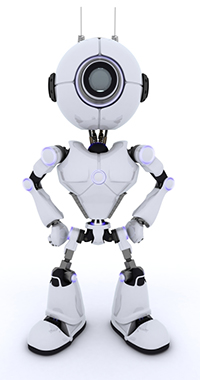Do Robots Behave?
Is behavior limited to living, organic creatures, like us, or can inorganic creatures created by organic creatures also behave? Like robots. The first thing to consider in answering this question is the definition of behavior. For the present purposes we’ll limit our consideration to what at this website we have called “operant behavior.” This is behavior that is affected by its consequences, that is, by the reinforcers or punishers that follow it. When behavior produces a consequence, there are three possibilities: it can stay the same, or maintain; or it can increase or decrease. So if a response increases as a result of a consequence, it is an instance of operant behavior. Note that the definition is strictly in terms of its effects. It doesn’t consider whether the behavior has resulted from thoughts, feelings, the self, or any other internal state of the creature.
Nor does the definition require an organic creature. We could finesse the question posed in the title by simply including organic creatures as part of the definition and just answer “no.” The more interesting alternative, though, is to consider the possibility that “inorganic creatures” like robots also behave.
 Let’s consider first a simple home heating system. When the temperature falls below the desired level, the thermostat switches the heating system on. When the temperature reaches the desired level, the system switches off. The feedback from the environment in terms of ambient temperature changes the behavior of the switch – it goes from on to off or off to on. Thus an environmental consequence (a change in room temperature) increases or decreases the likelihood of the system (thermostat switch) activating. The consequence of the room cooling is to turn the switch on to increase the heat and the consequence of the room heating is to turn off the switch. The behavior of the switch is determined by its consequence of heating the room or allowing it cool.
Let’s consider first a simple home heating system. When the temperature falls below the desired level, the thermostat switches the heating system on. When the temperature reaches the desired level, the system switches off. The feedback from the environment in terms of ambient temperature changes the behavior of the switch – it goes from on to off or off to on. Thus an environmental consequence (a change in room temperature) increases or decreases the likelihood of the system (thermostat switch) activating. The consequence of the room cooling is to turn the switch on to increase the heat and the consequence of the room heating is to turn off the switch. The behavior of the switch is determined by its consequence of heating the room or allowing it cool.
 Or how about a robotic vacuum cleaner, scurrying around the floor sensing objects with its photosensitive electronic eyes and moving in relation to those objects as a result of the feedback it is receiving. A clear path is met with continuing to move forward as it does its tidying little thing, and an object in its path causes the robot to stop or change directions before continuing with doing its tidying thing. Is this robotic activity operant behavior? By our definition of operant behavior above, the robot is indeed behaving. So long as the path is clear behavior continues in its present direction, but if it encounters a consequence in the form of an obstacle, its behavior changes.
Or how about a robotic vacuum cleaner, scurrying around the floor sensing objects with its photosensitive electronic eyes and moving in relation to those objects as a result of the feedback it is receiving. A clear path is met with continuing to move forward as it does its tidying little thing, and an object in its path causes the robot to stop or change directions before continuing with doing its tidying thing. Is this robotic activity operant behavior? By our definition of operant behavior above, the robot is indeed behaving. So long as the path is clear behavior continues in its present direction, but if it encounters a consequence in the form of an obstacle, its behavior changes.
 To count as operant behavior, a system, organic or inorganic, must change as a function of the consequences that it produces/incurs. Sometimes systems change, or are changed, but the change is in response to something other than the consequences of the system’s actions. In the case of our robotic vacuum cleaner, the action of vacuuming is not affected by its consequences (but we could make it so). Anything in the robot’s path gets swept up in that path, whether it is a dust bunny or the family pet bunny. The consequence of there being a real bunny in front of the robot, however, could be the basis for shutting off the vacuum switch in the same way that a hot room causes the heating system to stop operating. But without this feedback system, the switch is “dumb” and either powers up the vacuum or not as determined by the operator.
To count as operant behavior, a system, organic or inorganic, must change as a function of the consequences that it produces/incurs. Sometimes systems change, or are changed, but the change is in response to something other than the consequences of the system’s actions. In the case of our robotic vacuum cleaner, the action of vacuuming is not affected by its consequences (but we could make it so). Anything in the robot’s path gets swept up in that path, whether it is a dust bunny or the family pet bunny. The consequence of there being a real bunny in front of the robot, however, could be the basis for shutting off the vacuum switch in the same way that a hot room causes the heating system to stop operating. But without this feedback system, the switch is “dumb” and either powers up the vacuum or not as determined by the operator.
 All of this is not to say, of course, that robots are “just like” living creatures. They are obviously different in many, many ways, but the same general principles may apply to how they learn and otherwise behave in relation to their environments. Knowing what turns a robot on and off in terms of changes in its environment can help us see more clearly the ways our own circumstances and the consequences our behavior produces guide, prompt, and direct our own behavior as we live our everyday lives.
All of this is not to say, of course, that robots are “just like” living creatures. They are obviously different in many, many ways, but the same general principles may apply to how they learn and otherwise behave in relation to their environments. Knowing what turns a robot on and off in terms of changes in its environment can help us see more clearly the ways our own circumstances and the consequences our behavior produces guide, prompt, and direct our own behavior as we live our everyday lives.



